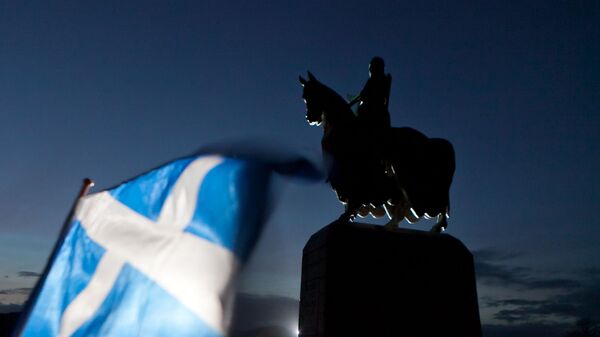British Prime Minister Boris Johnson visited Scotland this week while senior cabinet ministers were said to be in "panic mode" about the fate of the United Kingdom, as recent polls suggest that more and more people in Scotland support the country becoming independent. A poll conducted by Panelbase revealed that 54 percent of respondents want Scotland to secede from the United Kingdom, with experts saying that the support for a united Britain has never looked so weak.
British media reports say that the surge in pro-independence sentiment is linked to how Scottish First Minister Nicola Sturgeon has handled the coronavirus pandemic. 40 percent of respondents believe she dealt with the issue very well - that’s according to a Panelbase survey. Only 6 percent of respondents contended that PM Johnson has handled the coronavirus outbreak very well.
"For the pandemic to have a real impact on the question of Scottish independence, it would probably have to last a lot longer and get a lot worse", said Dr Roslyn Fuller, a Canadian-Irish author, columnist, and director of the Dublin-based non-profit think tank the Solonian Democracy Institute. Dr Fuller does not rule out such a scenario, but notes that during the 2014 referendum, the "No" vote won amid a high turnout (84 percent), which means the SNP would need to convince quite a few people to reconsider.
Dr Fuller stresses that it is highly unlikely that Downing Street would allow Edinburgh to hold a second referendum on independence.
"However, as the Conservatives have nothing to gain and everything to lose by agreeing to a referendum, it is highly unlikely that they will. Scottish voters may not approve of [Prime Minister Johnson], but they haven't approved of Conservatives in a long time - if independence only depended on Scottish voters detesting English Conservatives, they would have separated a long time ago. Any referendum would also come to hinge to a great degree on Brexit with the European Union likely offering good terms to an 'independent' Scotland to re-join - another reason why the British government will put holding one off for as long as they possibly can", Dr Fuller said.
The surge in public support for Scottish independence is also driven by a looming no-deal Brexit, she said
Professor Alex de Ruyter, a regional economist at Birmingham City University and director of the Centre for Brexit Studies, noted that it seems likely that the government of Boris Johnson won’t be able to break the deadlock in negotiations with the European Union by the end of the transition period.
The no-deal Brexit is "particularly egregious" for Scotland, argues Professor Ruyter, as the majority of Scots voted to remain in the bloc. Professor Ruyter is confident that Sturgeon and her SNP party will win next year’s parliamentary elections in Scotland and will push for an independence referendum that will likely create a political crisis in the United Kingdom.
"And the road will be littered with other battles before then, with the Scottish government refusing to comply with any UK government attempts to impose a 'UK-wide internal market' on Scotland that would enable the importation of chlorinated chicken from the US, for example. If the Scottish government refuse to play along here, we could end up with a partial UDI scenario whereby significant chunks of British law would be unenforceable in Scotland. It is likely that the cracks in the Union Jack are about to get wide”, said Professor Ruyter.




